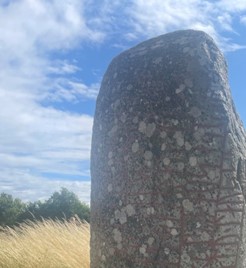2023: The Year of Lightness
This blog is adapted from the Head’s opening assembly of the academic year
I’d like to transport you, if I may, to a wheatfield, on a small island in the Baltic Sea, just off the East coast of Sweden, an island called Oland.
At the end of July I found myself in this wheatfield entirely by accident. There were no signs to it, it didn’t appear in the guide book or on google maps; there was certainly no souvenir shop peddling tat or over-priced café with undrinkable coffee; and – magically – there was no one else around as far as the eye could see. Just us, and some wheat, and this:

a rune stone and – what’s more – not just any rune stone, but the Karlevi rune stone, inscribed with the only known full stanza of Old Norse skaldic verse in Viking Age runes. It dates to the 10th century and is so old it even references Thor’s daughter.
But of course I didn’t know any of this at first as, I’m not exactly fluent in runes – a mystical language which I can’t read – and so the stone seemed even more magical as we tried to unlock its meaning. I found the not-knowing very peaceful, and reassuring. And I sort of couldn’t believe that I got to touch it, and sit with it, and experience the antiquity of it, and feel like we were a very small part of an ancient and ritualistic past.
But why are we starting our school year with a 1000-year-old stone?
Well, for one thing, it was just there. It wasn’t showy, or heralded; no one had commercialised it or made pencil sharpeners or key rings to commemorate it; and it was allowed to stand in its field where it was originally placed, despite erosion by the keen winds and storms which whip off the Baltic; no one had dug it up and taken it to a temperature and light controlled museum. And I loved that. I like it when we do things for the sake of the thing itself, when things are allowed to be authentic and discoverable and intriguing, rather than sanitised and ring-fenced.
And I also like things which have meaning within themselves. That matter just because.
And this mattered to me; it felt like a real moment of peace and enjoyment, one I was determined I would hang onto throughout a busy year.
So this term I’m going to be asking you: what matters to you? And are you pursuing your passions because they matter to you? Are you doing things because they seem shiny and like they’ll lead you to glossy success, or because they are meaningful and make you feel a connection with our glorious, inspiring world? Read, think, discuss, play, work hard, find out – but do so because you have good, strong brains and lively imaginations and are brimful of curiosity and because you love life – and not because you feel under pressure to achieve.
And all of this fits with our key academic theme this year, Playful Scholarship, which we as a staff body have been exploring as we prepared for your return this week. It’s not a contradiction to celebrate individual and collective achievements such as essay prizes and sporting victories and exam grades, whilst also asking you to pursue your interests for their own sake, and nor is it a contradiction to ask you to be both playful and scholarly, light in your approach and deep in your thinking. In fact, it’s only when the two come together that the world ignites with endless possibilities.
And if I had one wish for all of you this year, it would be that you can adopt this playfulness and lightness in your pursuit of excellence; because living and learning must be enjoyable above all else, and excellence can only come as the outcome of that. As Aldous Huxley tells us, and as I quoted at Speech Day at the end of last term:
“It’s dark because you are trying too hard.
Lightly child, lightly. Learn to do everything lightly.
Yes, feel lightly even though you’re feeling deeply.
Just lightly let things happen and lightly cope with them.”
May this be the year of lightness, of playfulness, and of the pursuit of scholarship which is for its own sake; and I promise you, everything else will surely follow.
